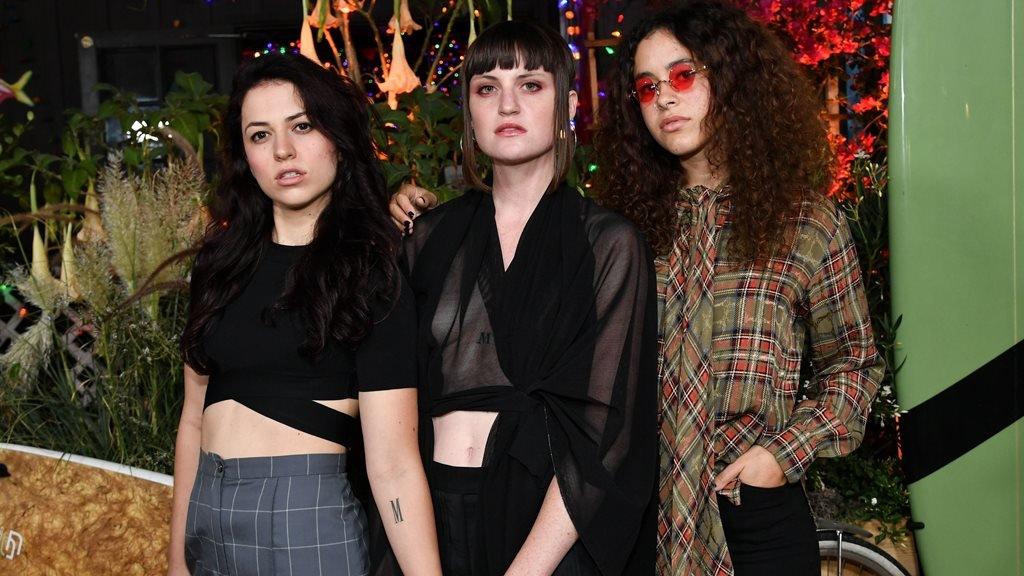In pop, stars are exploring new sexualities
- Published
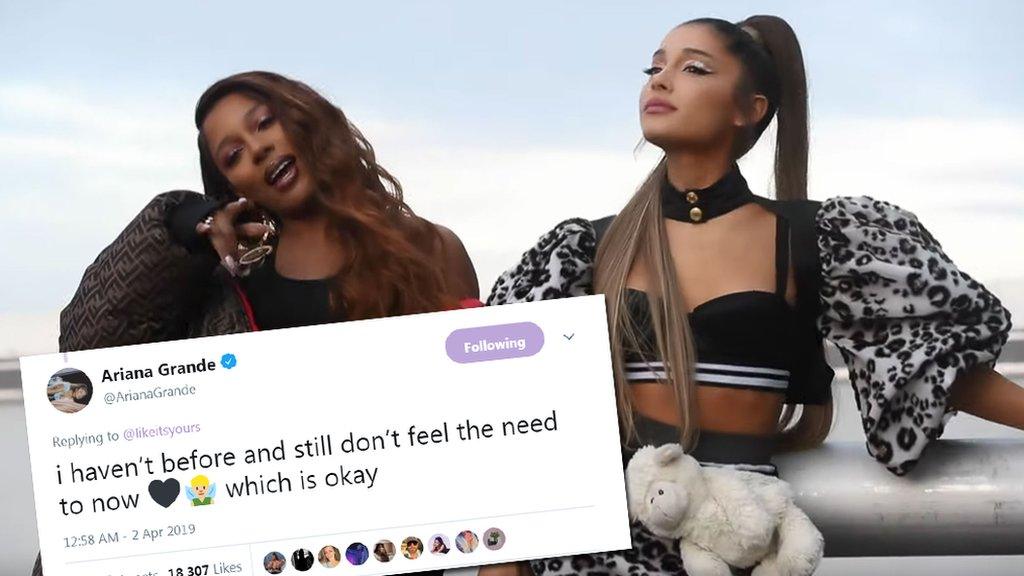
Ariana Grande said she "didn't feel the need to label" her sexuality
Last week, Ariana Grande set the internet on fire with a lyric that suggested she was bisexual. But what was truly remarkable was how unremarkable the line was.
"I like women and men," the 25-year-old sang casually on Monopoly, external, a duet with her friend Victoria Monet.
It was a throwaway comment, sandwiched between lyrics about songwriting royalties and her overwhelming workload ("I need a twin") but it sparked a flurry of speculation about the star's private life.
"Is she bi or nah?" asked one fan on Instagram, to which Monet replied: "She said what she said."
'My first love'
On Twitter, another fan commented, "Ariana ain't gotta label herself," prompting the pop star to respond: "I haven't before and still don't feel the need to now, external".
Grande isn't alone. After decades of closeted artists and coded lyrics, a new generation of gender and sexually-fluid pop stars are challenging stereotypes and celebrating their identity through music.
A significant breakthrough came in 2012, when Frank Ocean posted an open letter to Tumblr, external, describing how he'd fallen for a man when he was 19.
"It was my first love, it changed my life," he wrote. "There was no escaping, no negotiating with the feeling. No choice."
Notably, Ocean chose to address his bisexuality at the start of his career (the letter was originally destined for the liner notes of his debut album, Channel Orange) and it did nothing to harm his sales or his reputation.
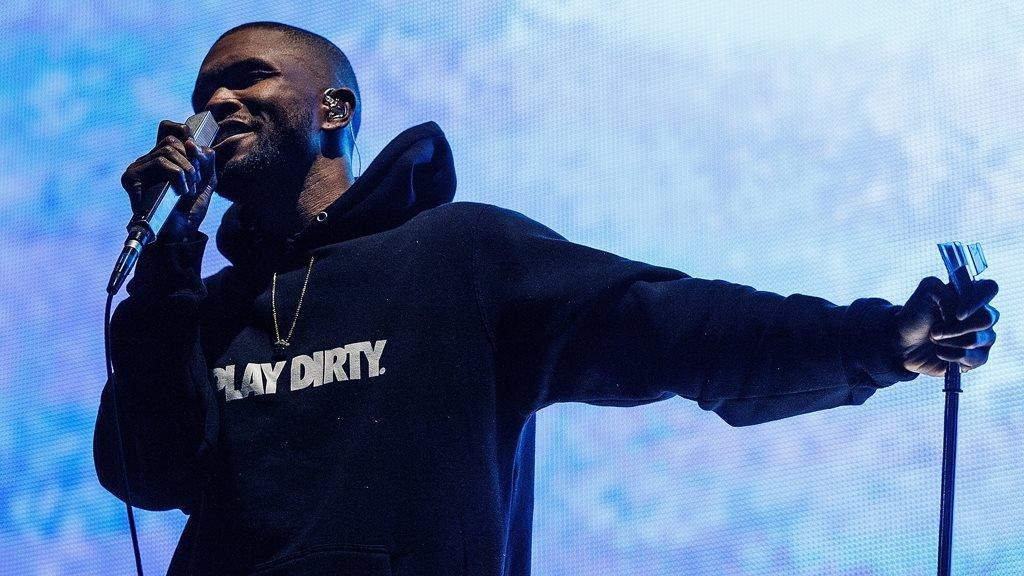
Frank Ocean addressed his bisexuality in the song Chanel, singing: "I see both sides like Chanel"
"I think the landscape has changed dramatically for queer artists," Olly Alexander from Years & Years told the BBC last year.
"In the past, we've all been familiar with pop stars coming out in the middle of their careers, or after they've become huge and that feels like a heavy narrative to queer people.
"Now it seems to be really changing that artists can be out from the start of their career; and it's not some sort of sensationalised headline."
In the last few years, artists like Anne-Marie, Troye Sivan, Harry Styles, Christine and the Queens and Demi Lovato have all talked about same-sex attraction or bisexuality in their lyrics.
Miley Cyrus has been particularly upfront, telling Paper Magazine, external: "I'm down with any adult - anyone over the age of 18 who is down to love me."
And when Janelle Monae defined herself as pansexual in a Rolling Stone profile last year, external, searches for the term rose by 11,000% on the online dictionary Merriam-Webster.
Pop songs are increasingly likely to feature same-sex pronouns and queer perspectives, while Monae earned a Grammy nomination for her song Pynk, a sex-positive celebration of female genitalia and self-love.
Allow YouTube content?
This article contains content provided by Google YouTube. We ask for your permission before anything is loaded, as they may be using cookies and other technologies. You may want to read Google’s cookie policy, external and privacy policy, external before accepting. To view this content choose ‘accept and continue’.
Joe Nellist from the LGBT Foundation, external says musicians are simply reflecting their generation's attitude to sexual identity.
"There's a growing number of young people aged between 16 and 25, that identify as lesbian, gay or bisexual. The figure currently stands at 4.2% [source: ONS, external], which is more than twice as high as the general population.
"It indicates we're moving towards a society that's more tolerant and accepting, where people feel confident and comfortable and able to come out at a younger age."
Getting it wrong
Musicians have also been given the licence to express their sexuality by structural shifts in the music industry, says Rachel Brodsky, managing editor at Grammy.com, external.
"In earlier days, popular artists were a little more fenced in, with executives no doubt prioritising what'll move records and make money," she explains.
"Like, if you talk about a taboo subject on a record, you risk some giant music emporium like Best Buy or Walmart not stocking that record.
"But the way music is consumed is totally different now, with streaming and the power of social media marketing. Nowadays, labels come after artists because of their authenticity, which usually translates to social media followers.
"So we see artists having a more significant upper hand when it comes to their image and what they say in their lyrics."
It doesn't always go smoothly.
Last year, Rita Ora was criticised for the chorus of her song Girls, in which she sang: "Sometimes I just wanna kiss girls, girls, girls/ Red wine, I just wanna kiss girls, girls, girls."
Some listeners were concerned the lyrics perpetuated a stereotype that women only hook up with other women when they're drunk or because it turns men on.
Ora apologised, saying she would "never intentionally cause harm to other LGBTQ+ people", but the incident showed how the world had moved on since Katy Perry sang she kissed a girl and she liked it - as long as her boyfriend didn't mind it.
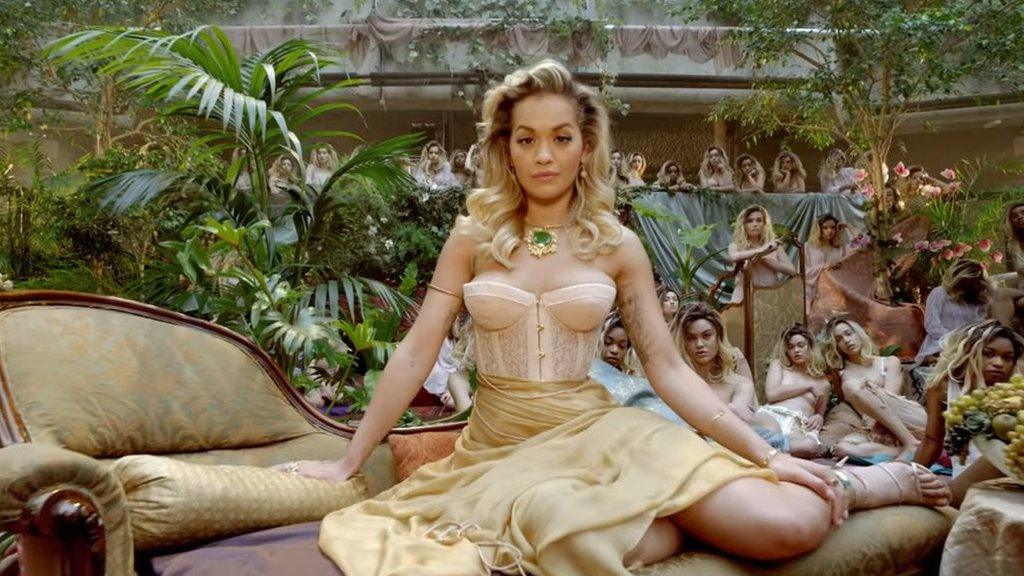
Rita Ora's Girls was supposed to be an anthem to female empowerment, but it seemed to backfire
The idea of bisexuality as a taboo is outdated and damaging, argued US star Halsey, whose songs depict relationships with both women and men.
"That narrative is so damaging to bisexuality and its place in society," she said,, external quoting the line "it felt so wrong, it felt so right" from Perry's song.
"That's something I've had to fight my whole life and something I still fight. I still see people on the internet saying, 'Of course Halsey says she's bisexual. It'll help her sell albums.'"
That charge has also been levelled at Ariana Grande, whose apparent declaration of bisexuality was labelled "queerbaiting" by people who pointed out that all of her (public) relationships have been with men.
'Sexuality scale'
But that's a problematic accusation itself - as though having a heterosexual relationship could somehow "cancel out" any same-sex attraction.
The reality is that more and more people are refusing to define themselves by those binary sexual choices.
When YouGov asked people to plot themselves on a "sexuality scale", more than a quarter of Britons chose something other than 100% heterosexual, external.
Facebook, which is as reliable a social barometer as any, also offers users more than 70 gender options, including bi-gender, pangender, non-binary and two spirit (although gender, it should be noted, is separate to sexuality).
Seeing these trends reflected in popular culture is hugely encouraging says Joe Nellist.
"The impact it can have for young people who are coming to terms with their own sexuality is really powerful," he says.
Even non-LGBT artists like Little Mix are "becoming real allies to LGBT people," he says - noting how the band recently played Secret Love Song under a rainbow flag, external in Dubai, where gay sex is illegal.
"It's a real positive move. It means that even non-LGBT artists are standing up for LGBT young people in particular."
Allow X content?
This article contains content provided by X. We ask for your permission before anything is loaded, as they may be using cookies and other technologies. You may want to read X’s cookie policy, external and privacy policy, external before accepting. To view this content choose ‘accept and continue’.

Pop singer King Princess agrees it's crucial to have positive role models.
"When I was a kid, I wanted somebody to look up to, whose music I was excited about, who was gay," she said in January.
Instead, she ended up following androgynous, but predominantly straight, artists like Marc Bolan, David Bowie and Led Zeppelin.
"There was this ambiguity from the people who were on stage, like, 'You don't have to be a boy, you don't have to be a girl, you can wear tight-ass pants.
"I was just like, 'This seems like my lane. I like this type of showmanship. This is making me feel comfortable about my sexuality. These guys are totally gay.'"
Now making music on her own terms, the singer is relaxed at being labelled a "queer icon in the making".
"I'm down to take that on," she says. "And it's not about my songs being gay. I hope my music's really thoughtful and strong and people just get with it. At the end of the day, that's really what this is about."
Allow YouTube content?
This article contains content provided by Google YouTube. We ask for your permission before anything is loaded, as they may be using cookies and other technologies. You may want to read Google’s cookie policy, external and privacy policy, external before accepting. To view this content choose ‘accept and continue’.
That's why Rachel Brodsky has reservations about acts like King Princess, Tegan and Sara and Troye Sivan being branded "queer pop".
"Queer isn't a genre, it's a sexual preference," she says. "And if we use the word 'queer' to describe someone's sound, we risk marginalising artists who, ideally, deserve to be integrated into the greater pop pool.
"It's like using the term 'all-female band.' What does it matter what someone's gender or sexual preference is when it comes to music?
"At the end of the day, everyone's an artist. Let's stick to describing sound as a form of classification instead of appearance and sexuality, shall we?"

Follow us on Facebook, external, on Twitter @BBCNewsEnts, external, or on Instagram at bbcnewsents, external. If you have a story suggestion email entertainment.news@bbc.co.uk, external.
- Published26 April 2018
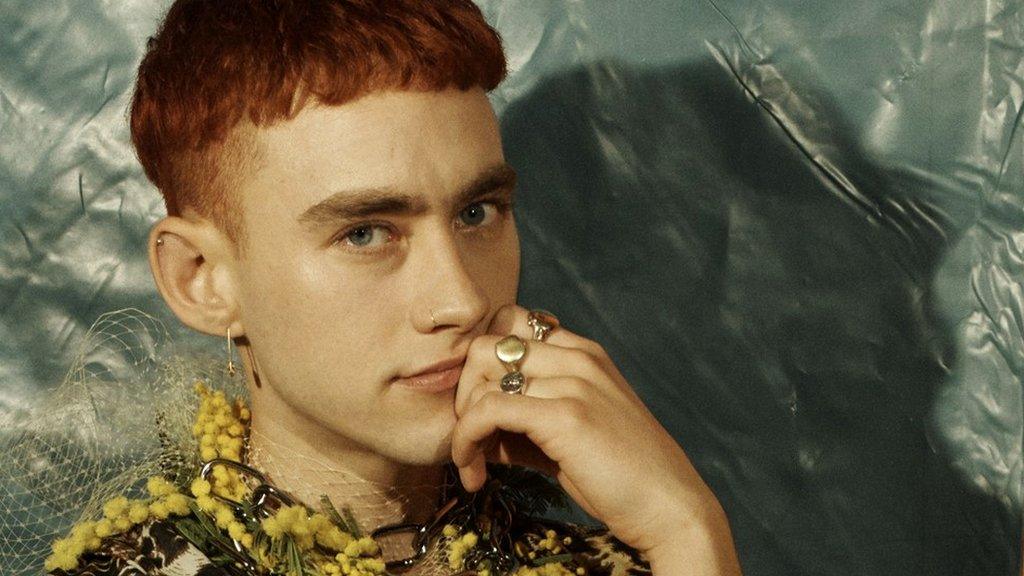
- Published10 January 2019
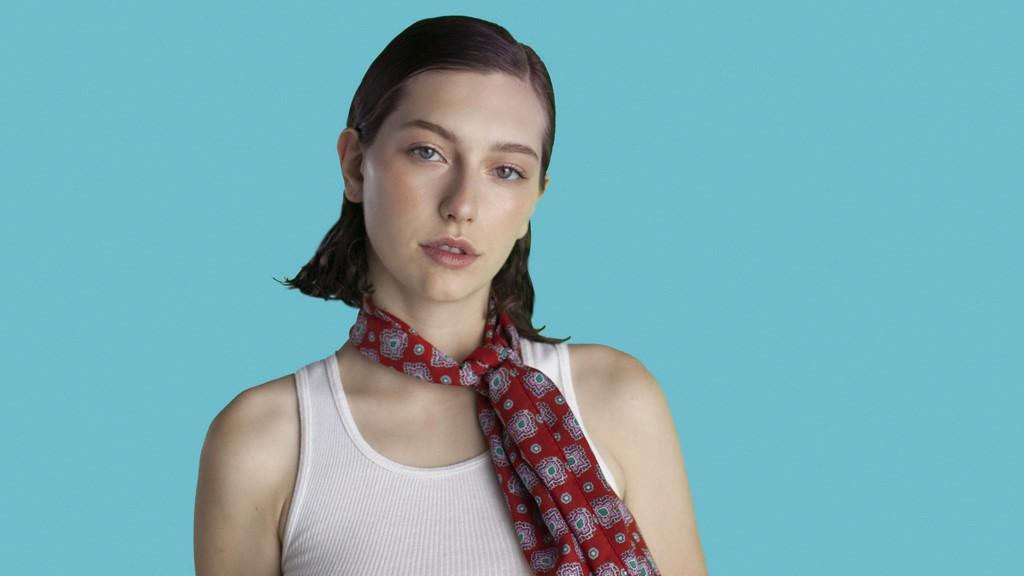
- Published5 November 2017
